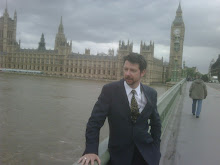Tapping into the widespread public anger over Westminster expenses the party leaders have started battling it out over who can be toughest on their errant MPs and who can be most radical in reforming parliament. Yesterday David Cameron called for a radical redistribution on of power "from the political elite to the man and the woman in the street." Many of the ideas are not new and if implemented the proposals could change politics, sometimes in some unexpected ways.Herald 27/05/09
Fixed term parliaments
Choosing the date to go to the country is the ultimate privilege of the Prime Minister and gives a huge inbuilt advantage to the government. David Cameron would consider ending the right of Downing Street to control a general election but he combines this with strident callsfor an early election. Not everyone in the Conservative Party is convinced by the new rhetoric and in 2007 Mr Cameron himself talked about the disadvantages of a fixed term parliament after Labour changed leaders without a new mandate.
Fixed-term parliaments do make it difficult to get rid of governments but standing orders at Holyrood allow for an interruption of Scottish Parliament’s fixed four year cycle. A Scottish government could be brought down only if two thirds of MSPs vote to dissolve parliament. If no other First Minister can be chosen within time, and the expectation is this would happen, then there would be an early general election. The Lib Dems have consistently supported fixed terms for Westminster and it was a Labour party policy until 1992. Canada, which has a similar system to Westminster, changed to fixed term parliaments in 2006 but the Conservative government flouted the rule, called an early election - and won. The lesson seems to be that changing the rules does not change the culture of politics.
Reduce the number of MPs
Mr Cameron has previously wants to cut the number of MPs by at least 10 per cent by redrawing of constituency boundaries. The average electorate in Conservative-won constituencies was 72,950 against Labour’s 66,802 and evening out the number of voters per constituency would, it is estimated, favour the Conservatives by about 20 seats.
Mr Cameron would require legislation to reduce the number of MPs and would be open to the charge of gerrymandering. The process, involving Boundary Commissions in four nations and public consultation, would take two parliamentary terms so the effort, to get rid of 60 MPs, would be considerable. An unwanted by-effect is that smaller party groupings are easier to control by the whips. The Boundary Commission for Scotland completed a review of Westminster constituencies in 2004 and a review is not due for about six years. The Tories say that the average number of voters per constituency could be different in each national Boundary Commission area. Making the Scottish constituencies in Scotland bigger would make a Tory revival even harder as their vote is spread across the country.
Increase voter power
Mr Cameron wants to give voters the chance to have proposals backed by large petitions debated by the Commons. Downing Street already has an e-petition site, following the pioneering example of the Scottish parliament site. Westminster petitions have no legislative standing but a huge petition against road tolling led to the policy being dropped like a hot potato. In Holyrood the petitions committee considers requests from the public and can feed into the legislative process. Mr Cameron says he would also open up parliament by sending out text alerts on the progress of bills and lifting the ban on viewing proceedings on YouTube. Debates and committees can already be viewed on the parliament website.
Electoral reform
Mr Cameron called for more "open primaries", used in parts of the US, where election candidates are chosen by all local people not just party supporters. This might reduce the power of trade unions and local party machines but opens the door to media influence and rich candidates outspending rivals to reach more of the electorate. MPs all admit that local parties, politically engaged and responsive to the public mood, are a more effective control than the wider constituency. Mr Cameron came out against Proportional Representation, the Constitutional "big bang" that some on the left, including Alan Johnson, feel would coalesce Labour and Lib Dem against Conservatives.
Boosting the role of Parliament
Mr Cameron has an ambition to curb the whipping of votes when MPs consider bills line-by-line at the committee stage. MPs would also be handed the crucial power of deciding the timetable of bills and be allowed to choose the chairmen and members of select committees. These were recommended by Ken Clarke’s democracy commission. Committee members are currently chosen by whips, in proportion to the size of parties, and the chairs are elected by the committees themselves. When the government whips tried to remove the late Gwynth Dunwoodie as chair of the transport committee they sparked a parliamentary rebellion. But how one party could stop whipping (controlling which way its MPs vote) and not give an advantage to other parties is a mystery. Mr Cameron also proposes
limiting the use of the royal prerogative which allows the prime minister, in the name of the monarch, to make major decisions without the backing of Parliament. Gordon Brown is already making sweeping changes in this area in the Constitutional Renewal bill, but Cameron says he would go further.
Freedom for local councils
Tory high command shrinks from calling this devolution but someone in Cameron’s office has been reading The Plan, co-written by Douglas Carswell MP, which advocates that the equivalent powers devolved to the Scottish parliament should be passed down to English councils. Cameron’s reforms sound more cuddly. Allowing councils to reverse Whitehall decisions to close popular services, such as a local post office. But voters do not like policy differentials across local boundaries, like health care in Scotland and England, and they tend to blame national government when things go wrong.




